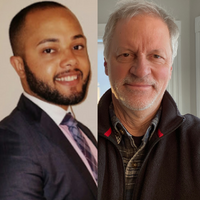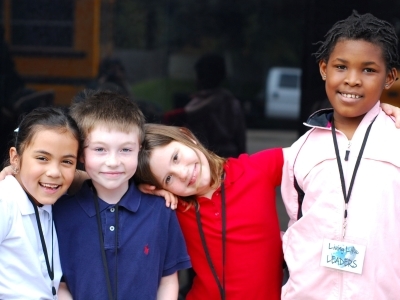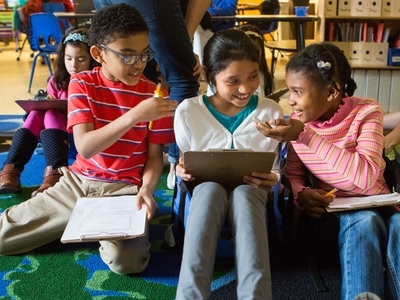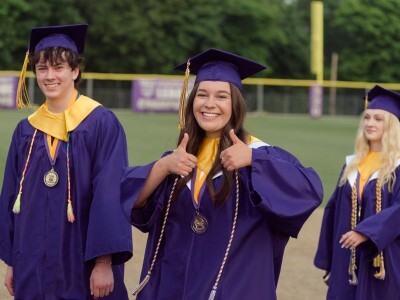7 Brave Choices toward a Bright Future for Your School, District, and Community
Topics
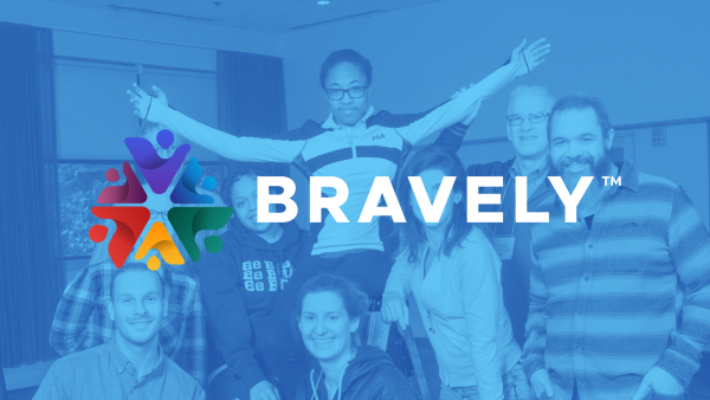
Today’s learners face a rapidly changing world that demands far different skills than were needed in the past. We also know much more about how student learning actually happens and what supports high-quality learning experiences. Our collective future depends on how well young people prepare for the challenges and opportunities of 21st-century life.
Public education in the U.S. is at a crucial crossroad. Here's what it looks like for school districts to choose Bravely.
Last week, we posted an article with this headline: Are We Transforming Our Education Systems Fast Enough to Save the Human Species?
We are not alarmists. Look around. More humans need to grow up learning how to be more human: better at listening, loving, continuously learning, embracing responsibility. Better at working competently and collaboratively to solve problems, parse information, understand complexity, embrace differentness, reject hate, and care for our small and miraculous planet.
If every one of us—meaning, every person, every child—had grown up within an environment like that, would the world be different today from the way it is?
Of course it would.
The best way to help make that happen for future generations? Start with your own community, right now, and enlist it in making the brave choices needed to turn your schools into species-saving engines. As the ancient Chinese proverb goes: the best time to plant a tree is twenty years ago. The second-best time: today.
Read on to learn about Bravely, a new national network of school districts and communities that will act on the following set of brave choices, from NGLC and an ever-growing alliance of mentor educators and partners. Start with the seven big, inertia-confronting ideas that are driving the design of the Bravely network here; then visit the Bravely webpage to learn about how you can join, what your experience in the network would look like, who from your community you would involve, and more. We also offer “office hour” sessions so we can answer your questions.
Brave Choice 1: Value People Over Systems and Trust Over Compliance.
The pandemic made it clear, if it wasn’t already before: far too many of our systems, including in public education, are obsolete, inherently unfair or inequitable, or based on faulty assumptions that have now been proved wrong. That goes for policy, governance, regulations, contracts, budgeting, operating models, and pedagogical design. New systems are being imagined and created, but they will take time to set in place. What successful schools and districts have done in this environment is to reemphasize the human dimensions of all the work they do—of strong relationships, culture, trust-building, belongingness, and personal agency throughout (adults and students alike)—over systems that are built on constant directives and that feed on compliance.
The Bravely network, which is registering new members now for the pilot year beginning late this summer, will help ed leaders see what these approaches look like in practice and foster their own pervasive, deeply-rooted, people-centered culture. NGLC’s own research and a wide body of evidence across many sectors emphatically underline this approach. Because lasting change really does happen at the speed of trust, plus agency.
The whole Bravely enterprise is driven by a lattice of strong relationships, high-trust interactions, and close-knit community.
Brave Choice 2: Live Your Community’s Inspiring Vision Right Out Loud. Not Just You: Everyone.
The lesson of the What Made Them So Prepared study of 70 high-striving schools and districts that NGLC and eight organizational partners conducted throughout 2021 was clear. Each of them seeks to be one with itself. The vision of student success, the philosophy and practice of learning, and the operating model among the adults: they are all the same. This is probably true of most public schools in the U.S. right now, but most are tuned to an insupportably narrow goal-set, locked in place by perniciously narrow testing and accountability, they teach narrowly in compliance with that goal-set, and they align their operations—and consequently, most adult mindsets—accordingly. It is coherent and orderly, in a way, but profoundly dissatisfying and incomplete. Most especially, for those who count the most: the students.
But if we all want our kids to grow up to be competent, caring, creative, collaborative, lifelong learning problem-solvers, we adults need to model those very same attributes in the ways we work and the learning experiences we provide. That’s why schools, districts, mentors, and provider-partners involved in the Bravely network will all commit to the following “Brave Agreement,” one of three foundational commitments for this initiative: To lead, learn, and model our vision of success organizationally, as our operating norms, to ensure that these changes endure.
Brave Choice 3: Honor Honesty; Pursue Fairness; Be Liberatory.
Many schools and communities—perhaps yours included—deepened their commitment to social justice, anti-racism, openness, and honesty in the wake of George Floyd’s murder in 2020. That long-needed impulse has lately come under political attack, with advocates baselessly accused of shaming White children and infusing school curricula with a legal doctrine (Critical Race Theory) that, prior to these attacks, was virtually unknown in the public K-12 community. But there are no principles more central to the American idea—startlingly unfinished though it may be—than honoring truth over deception, seeking fairness for all, and eliminating inequity where it is plain to see. If our public schools can’t stand up for these principles, then our collective future is bleak indeed.
Communities that are part of Bravely will learn to practice an integrated blend of liberatory and transformation design. In this approach, districts take on high-priority challenges—the work that everyone in their community agrees just has to be done—through cycles of inquiry, action, and reflection that involve deep listening in order to define the problems clearly; inclusive exploration and ideation to develop and try out imaginative solutions; a strong commitment throughout to honest consideration of all perspectives, including those of the historically under-served; and open affirmation that “this is how we do things here,” as the route to continuous strengthening of a high-trust, highly inclusive, high-performing culture.
Brave Choice 4: Choose Your Guides with Care.
We’ve been lucky, here at NGLC, to work closely with hundreds of educators and dozens of communities and partner organizations since our launch in 2011. We have heard two refrains loud and clear from these ed leaders: a) “The people we want most to learn from are experienced peers who’ve effectively addressed the challenges we’re facing;” and b) “It would help us a lot if providers would actually talk to each other and align their services at least a bit, so that we don’t have to do all of that work ourselves.”
Bravely answers both of those needs. Bravely services will include the voices of many educators from schools and districts across our various networks (as well as others we have yet to meet, but who have demonstrably catalyzed Bravely- aligned work). And we are assembling a Bravely Partner-Provider Alliance—a set of organizations that are well aligned with Bravely’s vision and methods, bring capacity and expertise that no one organization (including us) could have, and that are more than simply ready to deepen their own impact as part of a coherently organized assembly of partners. They have been actively searching for an opportunity to do exactly that.
Brave Choice 5: Go Far by Going Together.
We all rely on networks. We use them to learn, to explore, to share, and to produce good work together. In the words of the African proverb: to go fast, go alone; to go far, go together. Good teachers are constant users of networks, in their schools and beyond, and so are the most agile administrators. Superintendents shared that they relied extra deeply on their most trusted peers for useful advice and strategy-swapping during COVID. And they wondered, more than once, whether there might be an opportunity there for deeper organizational partnering, district to district, than their familiar experience with “clubhouse”-style monthly-meeting communities of practice.
NGLC has run communities of practice of many kinds for many years. We are convinced that there is a new species of this whole idea, waiting and ready to be explored, developed, and spread. Bravely will be organized around small, intensive communities of practice (CPs). (The coming pilot year, 2022-23, will focus on district CPs, but we may add CPs composed of schools or CMOs in future years.) Some CPs may be already formed; your district may be part of a regional or interest-based group that might consider joining Bravely together, perhaps in deep collaboration between your CP manager, if you have one, and NGLC. Others may be formed by funders or partner organizations around a central priority (e.g., authentic learning, performance-based assessment, equity and anti-racism, or moving toward a community school model). Still others might be composed of individual districts that desire to link up with a new set of like-minded peers.
The “connecting” dimension of this initiative doesn’t end there, however. All Bravely CPs are part of the much larger national network, affording efficiencies of scale and expanding the universe of potentially strong district co-learners. Bravely also helps districts connect more deeply within. Bravely will enable districts to develop their own internal CPs, all intent on learning and using the practices and mindsets of liberatory, transformation design. The whole Bravely enterprise is driven by a lattice of strong relationships, high-trust interactions, and close-knit community. As the noted organizational designer Margaret Wheatley observed: “There is no power for change greater than a community discovering what it cares about.”
Brave Choice 6: Build on Everything You’ve Already Built.
Public schools and districts have their own history, culture, voices, challenges, and differing sets of capacity. They have made deep commitments to certain programs, invested in certain platforms, and gathered around certain language. Too often, education programs, trainings, or consulting engagements forget this and require an entirely new start. But, NGLC has learned over the years that, in just the same way that powerful learning strategies leverage students’ strengths, the most impactful organizational strategies are designed around the same idea. And that is how Bravely is designed to operate. No Bravely district’s story of transformation will be the same as any other Bravely district. They may make the same “Brave Agreements,” but they will differ because each and every district is different and will be making unique choices on where to prioritize (see Brave Choice 7), how to proceed, and with what set of engaged stakeholders. Every learner is different and deserves an education system capable of recognizing that fact. Working with school districts is not in the least bit different.
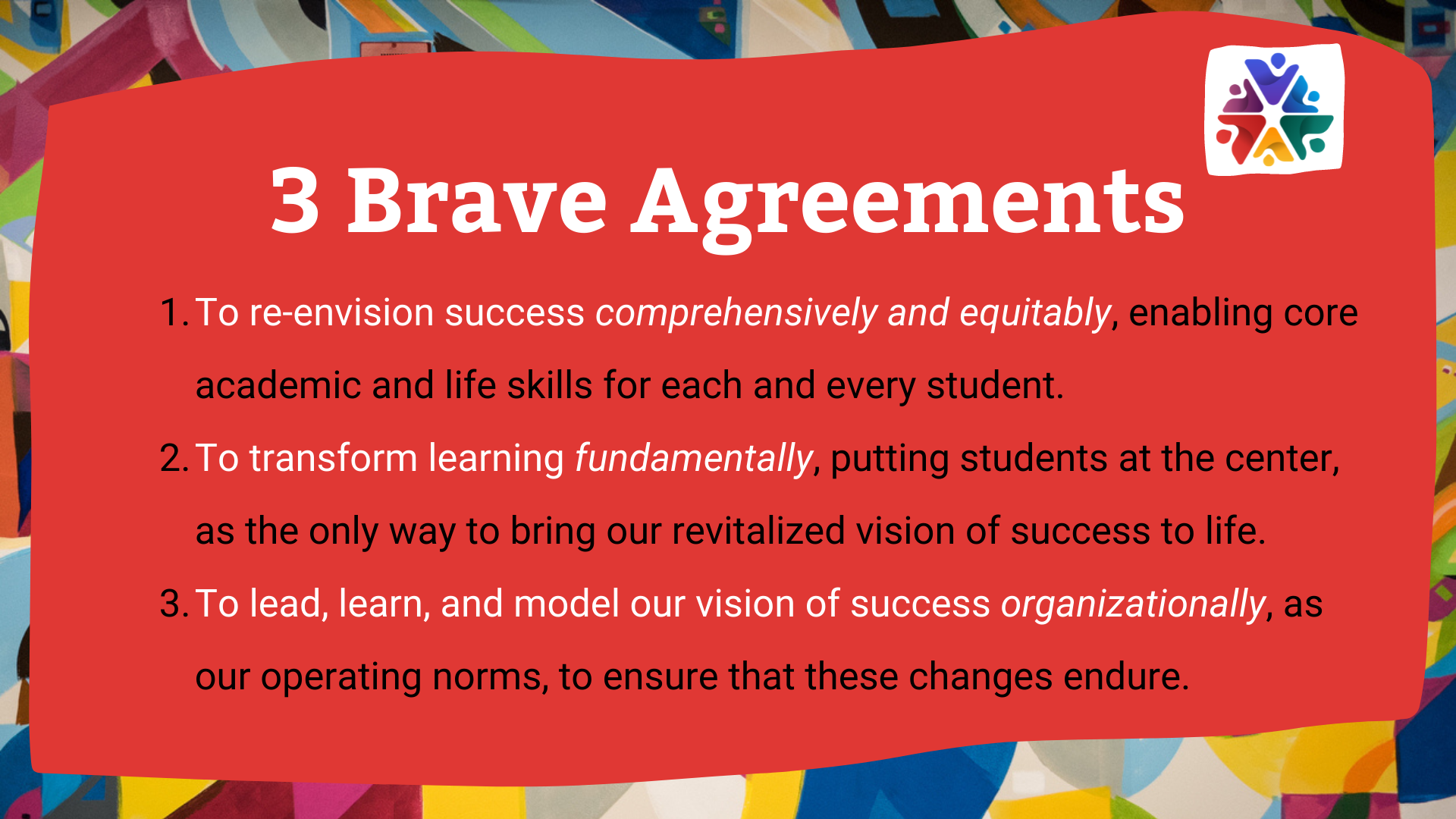
Brave Choice 7: Build Your New Culture in the Course of Solving Your Most Pressing Challenges.
It’s one of the core tenets of transformation design: you build better, healthier organizations not by studying healthfulness but by doing real work in healthier ways. Here again is that same parallel with well-designed student learning. You don’t develop persistence, or learn to take great photos, or discover the joys of geometry only by reading books on those subjects; you practice those skills in contexts that have meaning.
And so in Bravely, your district will choose your own path forward—the one that makes the most sense to you and your colleagues and stakeholders. You’ll choose your own problems of practice to focus on, using liberatory, transformation design—all the while learning, sharing, and engaging in productive, collaborative struggle with the other districts in your CP. No time is wasted; all work has context.
The Brave Choice that Can Catalyze Other Brave Choices
The design and launch of Bravely (as well as the four years of focused research that have directly led to it) have been enabled by generous grants from the Carnegie Corporation of New York. This fall, our pilot year, we anticipate working with just a small number—likely no more than five CPs. Over the next several years, we envision Bravely growing exponentially, serving hundreds of school districts in many dozens of CPs. Growth will depend on the experience Bravely districts have; their readiness to recommit to the network and their CP; their learning curve, so that Bravely-experienced educators might grow into roles as mentors; and on our ability and that of our partners to raise the philanthropic funds we envision using to match annual district fees. We hope that Bravely inspires much other work in public education that borrows from our approach. We plan to engage in fearless, universal sharing. Millions of young people and thousands of striving communities can’t wait.
For now, we respectfully ask interested district leaders to contact us (cbeato@nextgenlearning.org) to learn more about Bravely’s pilot year. We will all be learning together, this inaugural year, and we’re looking for a few brave districts and existing or newly-formed CPs to learn with us.
This is the dawn of a brave space for public education—an ecosystem designed to support and enable courageous choices and no less than species-saving work. There’s no time, if we’re truly being honest with each other, for anything less.
Photo at top courtesy of NGLC.

